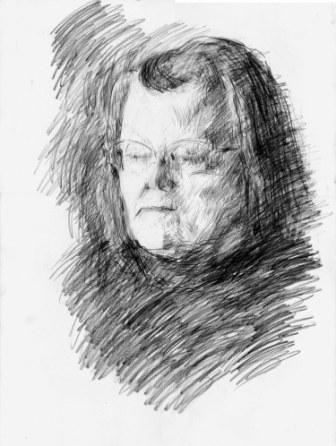Finding a home has been an important part of my own novels but hasn’t constituted the central plot. In 1990 when my mother-in-law died, Bill and I began to spend time with his aunt. She invited us to stay with her in the apartment she had lived in her whole life. I became intrigued by the interaction of the inhabitants of the other 19 apartments. I had written several novellas and decided to combine them into one massive novel about an apartment building, Temple House
The narrator of the novel writes, “What sold me on the apartment was its view of the Saint John River and across it to the hills beyond. I tried to ignore the dirty walls, the grimy bathtub, and the carpet smelling of cat urine…. I prospered in this sanctuary.” For 16 years I rented a study in such a building, the turret on the third floor, with 12 clerestory windows overlooking the river.
A poplar tree in our back woods is dying. It barely had the energy this spring to put out small, yellowish leaves. It is not dead but has to be cut down for fear that a winter storm might blow it onto the house. The presences of the trees around me are palpable. They have their stories, some of which I know, some I don’t. The spruce out in front was three feet tall when the whole family went on an outing with our neighbors to dig up trees from an abandoned farm. It is now 40 feet tall. Our plowman cuts branches from the bottom when they threaten to scratch his truck. Beside it is a maple my father dug up and planted when he and my mother came for their first visit. Some day I might have to have them cut down if they too threaten the house.
…if I were asked to name the chief benefit of the house, I should say: the house shelters daydreaming, the house protects the dreamer, the house allows one to dream in peace…Now my aim is clear: I must show that the house is one of the greatest powers of integration for the thoughts, memories, and dreams of mankind. The binding principle in this integration is the daydream. Past, present and future give the house different dynamisms, which often interfere, at times opposing, at others stimulating one another. In the life of a man, the house thrusts aside contingencies, its councils of continuity are unceasing. Without it, man would be a dispersed being. It maintains him through the storms of the heavens and through those of life. It is body and soul. Gaston Bachelard, The Poetics of Space
In the first ten years of my life we moved nine times. After my mother died, I asked Aunt Tempie why. She seemed surprised that I didn’t know. My mother, she said, would paint and paper, Tempie helping her, and make the rented place so attractive that it would be sold. When finally we could buy a house, the joy in our family was great. My father stopped creating watercolors so that he could spend his spare time fixing up the house. One of my obsessions is that members of my family and even my friends have a safe, pleasant home. “Homeless” is a heartbreaking word. Every month I send money to an elderly friend because otherwise she would have to move from her cozy apartment to unattractive senior housing. She and her husband think I’m an angel, but my action is completely selfish. My mother often confessed her worry to me, even when I was as young as ten, that this friend would “end up in the poor farm” because of her extravagant ways. My mother had a cousin, Willy, who would walk to our house from the poor farm, a distance of perhaps 15 miles. Willie had been horribly mistreated by his stepmother and was such a woebegone creature that my mother’s heart went out to him.
A boy who had lived here in our neighborhood had also had a sad childhood. When he was about 25, he unaccountably was able to buy a piece of land and a wretched used mobile home way out in the country. He soon learned how to tap our hearts—needing money for essential upkeep or taxes--the list was long. Tears in his eyes, he would say, “It’s my home, and I’m going to lose it.” People assured us that we were being foolish, pouring money down a rat hole. But it was a cozy rat hole, and as he often reminded us, the only real home he had ever had. He died at 40 and was able to keep his house until the end.
The well-being I feel, seated in front of my fire, while bad weather rages out-of-doors, is entirely animal. A rat in its hole, a rabbit in its burrow, cows in the stable, must all feel the same contentment that I feel. Maurice de Vlaminck, letter
